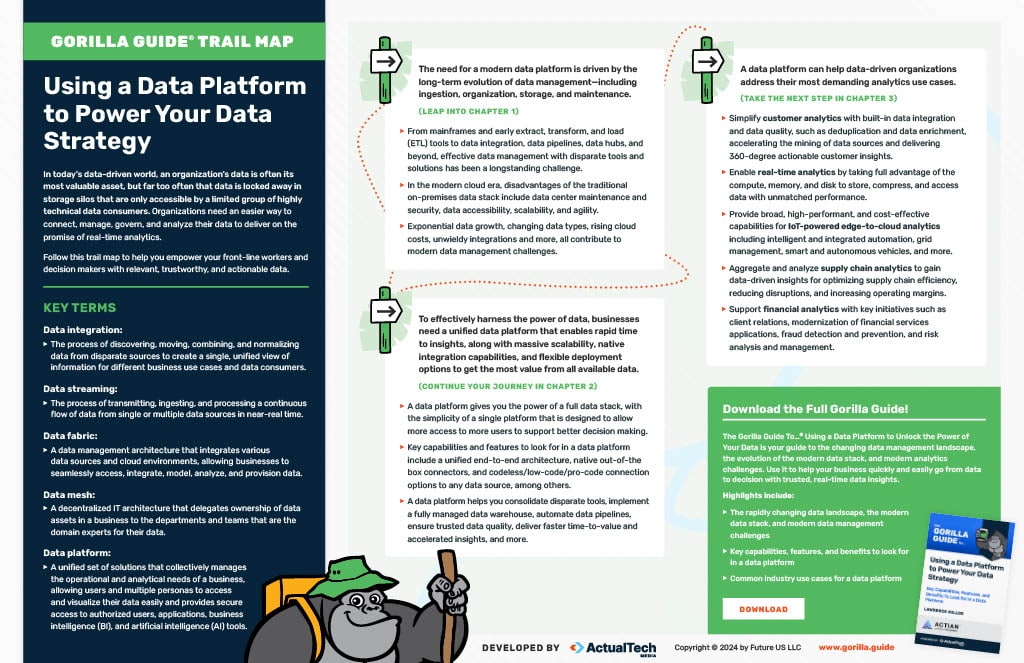Using a Data Platform to Power Your Data Strategy
Traci Curran
September 3, 2024

In today’s fast-paced digital landscape, organizations are increasingly recognizing the critical role that data plays in driving business success. The ability to harness data effectively can lead to significant competitive advantages, making it essential for businesses to adopt robust data management strategies.
Understanding the Importance Data Strategy for Data Management
Data management involves collecting, storing, organizing, and analyzing data to inform business decisions. As the volume and complexity of data continue to grow, traditional data management methods are becoming inadequate. Organizations often find themselves dealing with data silos, where information is trapped in isolated systems, making it difficult to access and analyze. According to the McKinsey Global Institute, data-driven organizations are 23 times more likely to acquire customers, six times more likely to retain them, and 19 times more likely to be profitable than their less data-savvy counterparts. This statistic underscores the necessity for businesses to implement effective data management practices.
The Evolution of Data Platforms
Historically, data management relied heavily on on-premises solutions, often requiring significant infrastructure investment and specialized personnel. However, the advent of cloud computing has transformed the data landscape. Modern data platforms offer a unified approach that integrates various data management solutions, enabling organizations to manage their operational and analytical needs efficiently. A data platform is a comprehensive solution combining data ingestion, transformation, and analytics. It allows users across the organization to access and visualize data easily, fostering a data-driven culture.
Key Features of a Modern Data Platform
When selecting a data platform, organizations should consider several critical features:
Unified Architecture
A data platform should provide a centralized data warehouse that integrates various data sources, facilitating easier access and analysis.
Data Integration Capabilities
The ability to connect and transform data from disparate sources is essential for creating a single source of truth.
Real-Time Analytics
Modern platforms support streaming data, enabling organizations to analyze information as it arrives, which is crucial for timely decision-making.
Data Quality Management
Features that ensure data accuracy and consistency are vital to maintain trust in the insights derived from the data.
User-Friendly Analytics Tools
Built-in visualization and reporting tools allow users to generate insights without extensive technical expertise.
Overcoming Modern Data Challenges
Despite the advantages of modern data platforms, organizations still face challenges such as:
- Data Overload: The exponential growth of data can overwhelm traditional systems, making it difficult to extract meaningful insights.
- Cost Management: As organizations move to the cloud, managing operating costs becomes a top concern.
- Skill Shortages: The demand for data professionals often exceeds supply, hindering organizations’ ability to leverage their data effectively.
To address these challenges, businesses must adopt innovative technologies that facilitate rapid insights and scalability while ensuring data quality. If you’re looking to advance your use of data to improve your competitive advantage and operational efficiency, we invite you to read our new Gorilla Guide® To… Using a Data Platform to Power Your Data Strategy for a deep dive into the benefits of a unified data platform.
Subscribe to the Actian Blog
Subscribe to Actian’s blog to get data insights delivered right to you.
- Stay in the know – Get the latest in data analytics pushed directly to your inbox.
- Never miss a post – You’ll receive automatic email updates to let you know when new posts are live.
- It’s all up to you – Change your delivery preferences to suit your needs.

